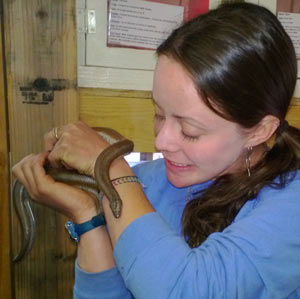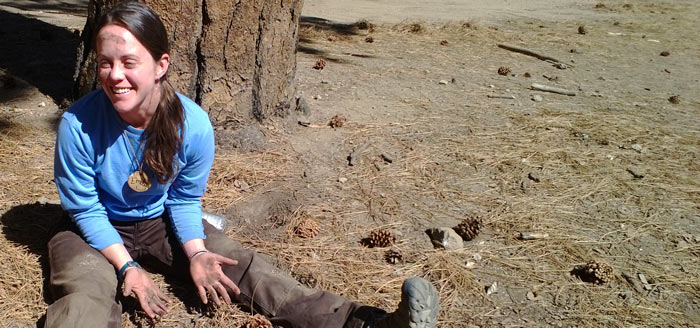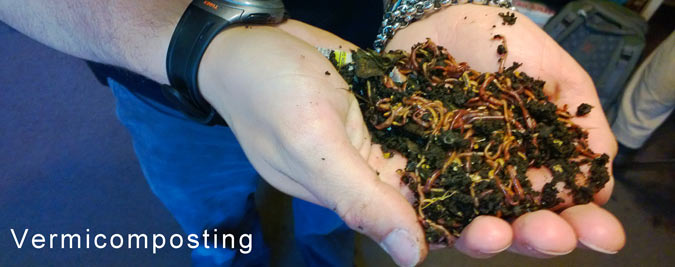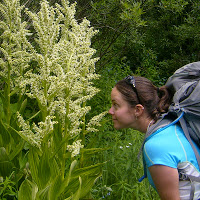In my ninth week as a new instructor, I’ve learned quite a bit from my students.
 For one, not to underestimate their ability to adapt. I’m somewhat ashamed to say that I was surprised when students who seemed impossibly homesick didn’t go home. I didn’t expect students who were afraid of our dark cabin on the first night to delight in starlit hikes without flashlights a few nights later. I watched one girl with a self-proclaimed severe phobia of snakes curiously pet Aggie, a Rosy Boa Constrictor I held out to her, and I have lost count of how many students who were “really, really, really scared of heights” that made it to the top of our climbing wall.
For one, not to underestimate their ability to adapt. I’m somewhat ashamed to say that I was surprised when students who seemed impossibly homesick didn’t go home. I didn’t expect students who were afraid of our dark cabin on the first night to delight in starlit hikes without flashlights a few nights later. I watched one girl with a self-proclaimed severe phobia of snakes curiously pet Aggie, a Rosy Boa Constrictor I held out to her, and I have lost count of how many students who were “really, really, really scared of heights” that made it to the top of our climbing wall.
Now, I’ve begun to set my expectations higher.
Our students know the basic rules; listen to their instructors, be quiet when an adult’s hand goes up, and not throw rocks or sticks. They know to drink lots of water, wear sunscreen, and not fight. So now, when I end my shift and send students off to their next activity, I leave them with an often overlooked message:
I tell them to get dirty, because no one else ever has.

According to Richard Louv, author of the 2005 book “Last Child in the Woods,” our children are suffering from Nature Deficit Disorder. He claims that humans—especially the youngest generation—do not spend enough time outdoors, and this has resulted in a wide range of behavioral and developmental problems. From rapid improvements in technology to greater accessibility of entertainment to parental fears associated with unstructured playtime, children no longer have (or even want) the freedom to roam as previous generations have. It seems we’ve been tamed.
As an outdoor educator, I agree with Louv. Most of us in this field probably do—our jobs are centered on the idea that there are intrinsic benefits to interacting with nature, learning about the environment, and challenging individual comfort zones. However, it’s difficult to measure the importance of being able to navigate with a topographical map and compass in an age where smart phones and GPS units rule the roads. Only hikers and backpackers need a true sense of direction. We’ve devalued these skills as no longer necessary. Instead, it seems that more practical talents are encouraged such as scheduled after-school activities that look good on college applications.

As just one of the effects, our built-in reflex of curiosity toward insects, plants, snakes, and animals has morphed into an “ick” reaction—worried it bites, feels slimy, is dirty, or smells strange. Louv might have us believe that the wonder is gone. But there is hope.
 Yes, I have had students tell me that stars through a telescope look “like a mouse on a computer screen.” And when I asked one group on our first hike what they thought of the forest, they said it was cool that someone came and planted so many trees in one place. They had no concept of wilderness, but from what I have witnessed in the past nine weeks, by the time students leave here, that changes.
Yes, I have had students tell me that stars through a telescope look “like a mouse on a computer screen.” And when I asked one group on our first hike what they thought of the forest, they said it was cool that someone came and planted so many trees in one place. They had no concept of wilderness, but from what I have witnessed in the past nine weeks, by the time students leave here, that changes.
While Louv’s observations may paint a grim picture, our wild human instincts are still intact—they are simply hidden. They need some exposure, which is where our roles as outdoor educators come into play. I want my students to overcome their fears of everything outside. That often begins with sitting on the ground with rocks, leaves, and ants…and getting dirty.

At High Trails Outdoor Science School, we literally force our instructors to write about elementary outdoor education, teaching outside, learning outside, our dirty classroom (the forest…gosh), environmental science, outdoor science, and all other tree hugging student and kid loving things that keep us engaged, passionate, driven, loving our job, digging our life, and spreading the word to anyone whose attention we can hold for long enough to actually make it through reading this entire sentence. Whew…. www.dirtyclassroom.com

Comments are closed.